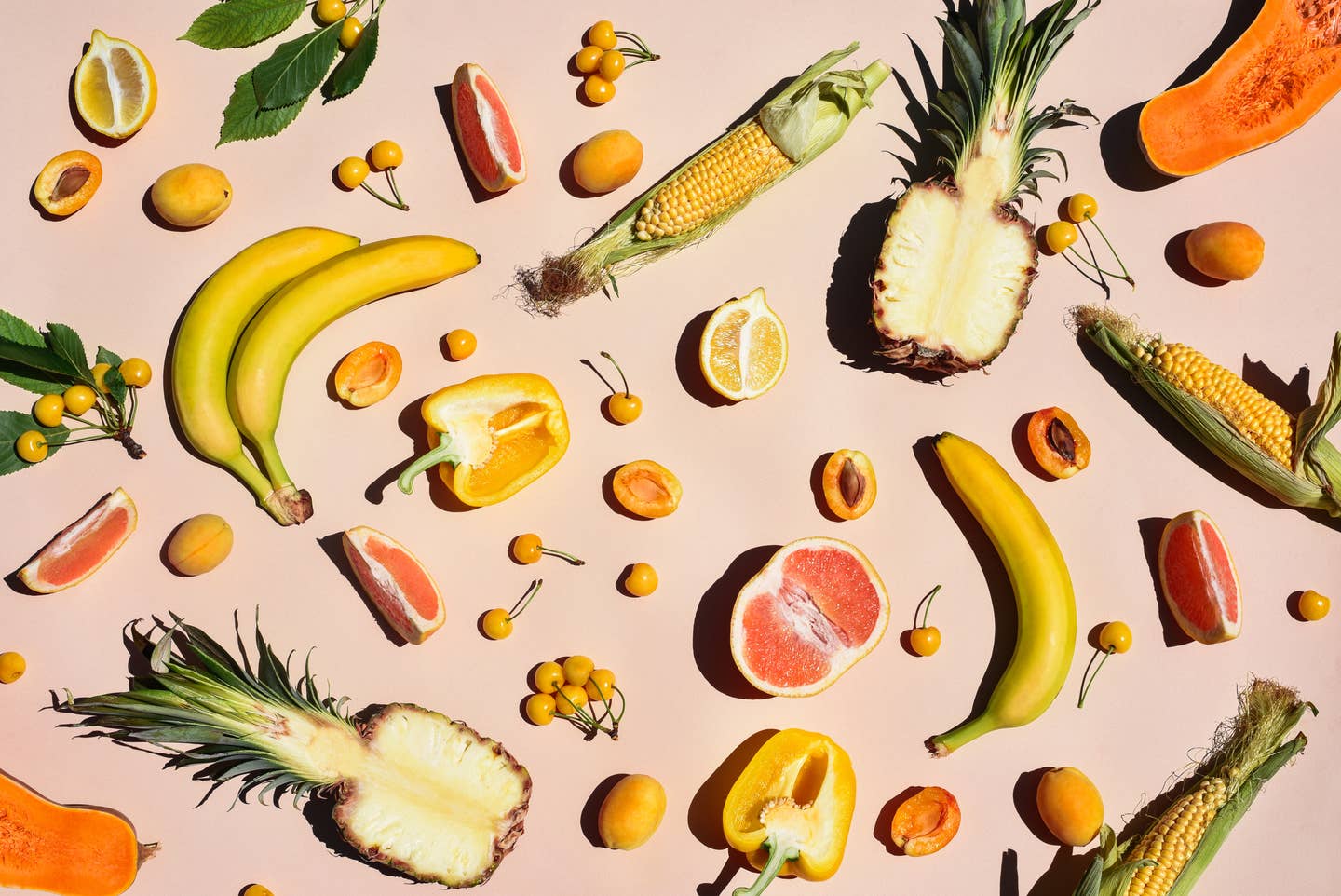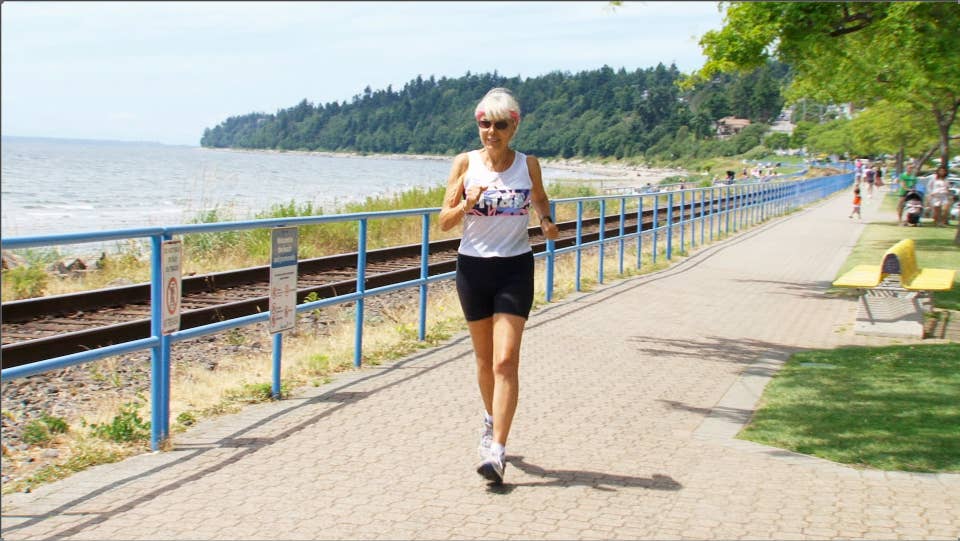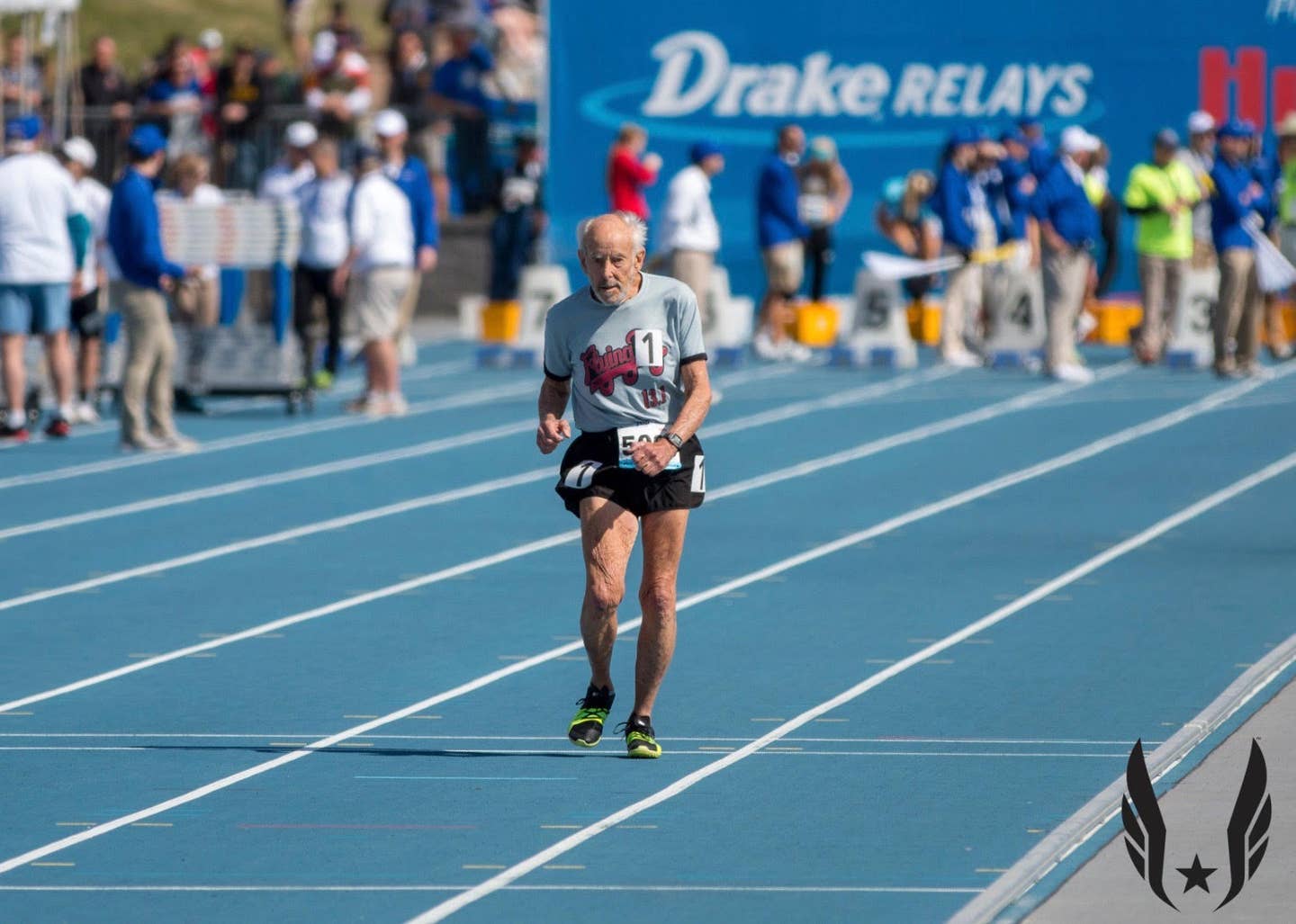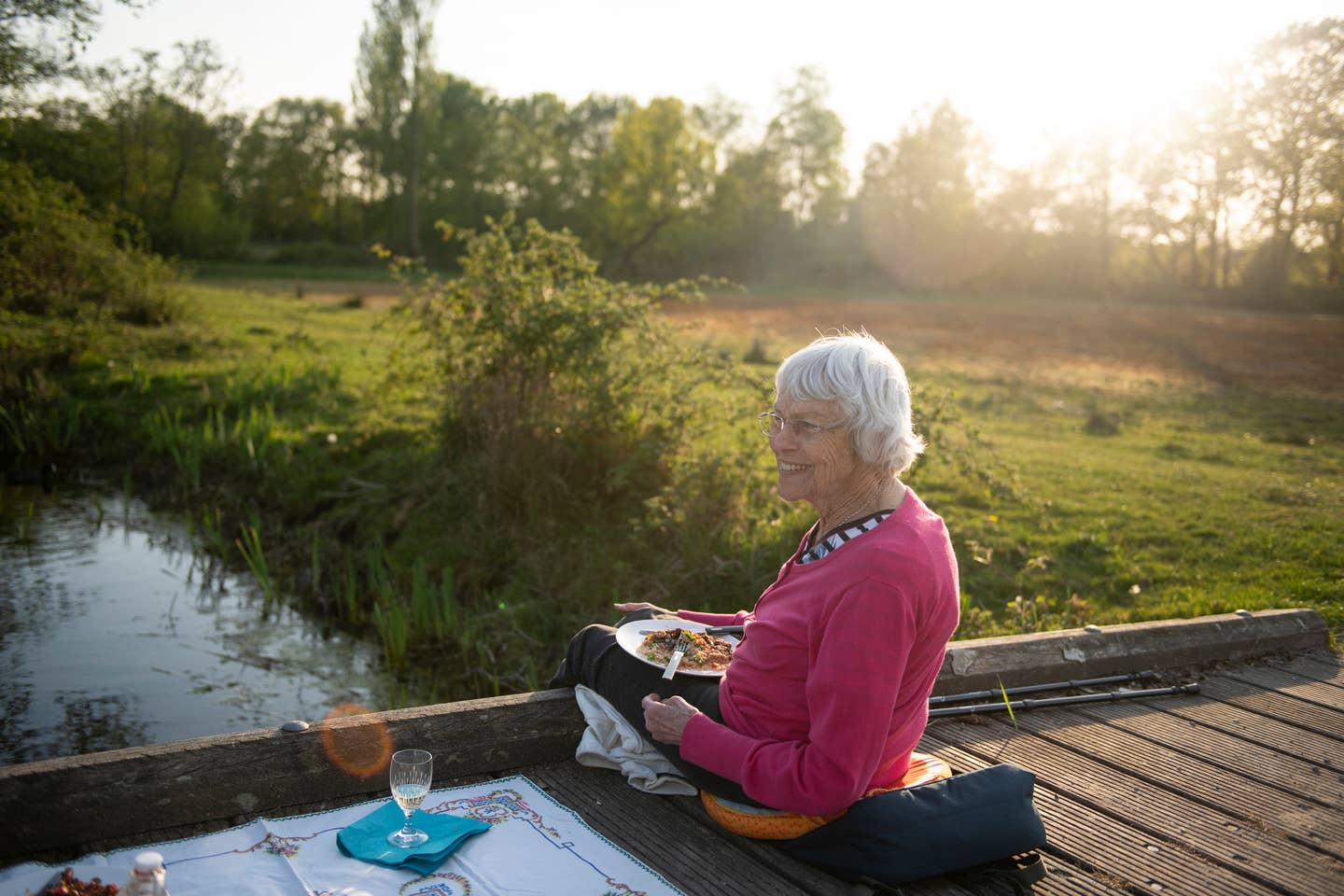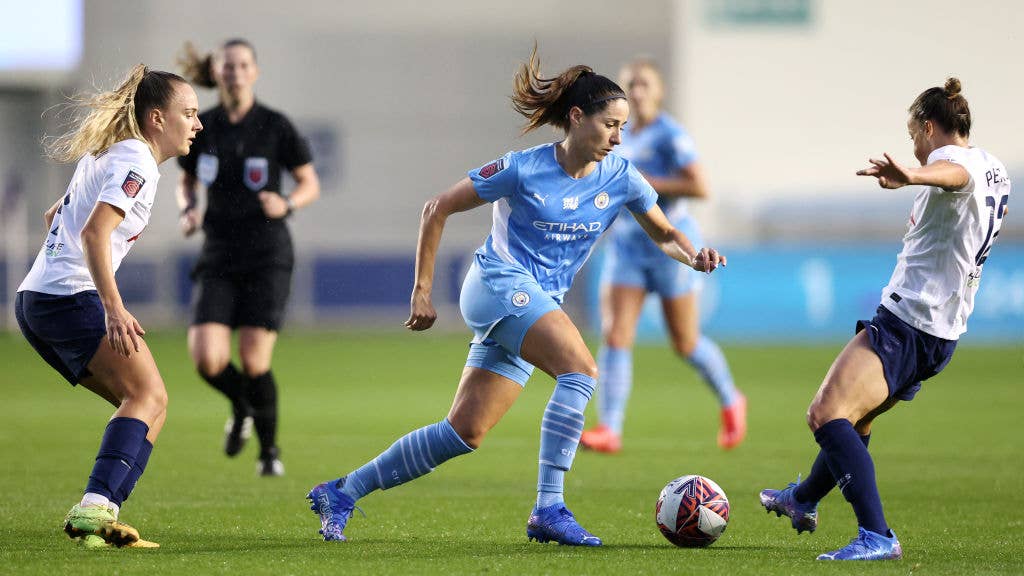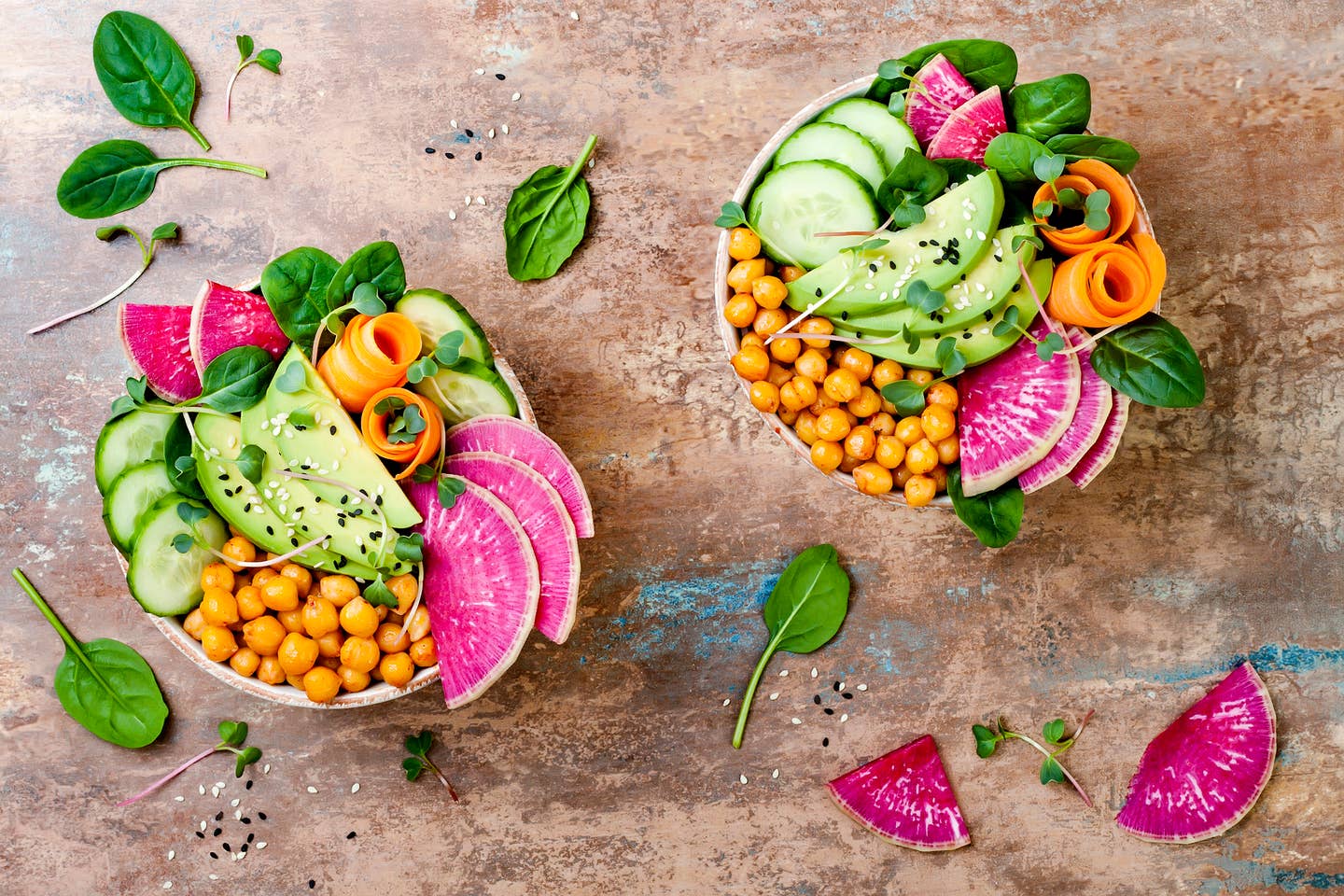
This Woman Went Raw Vegan After Ovarian Cancer and is in Remission
Barbara Livesay had been around the health care world most of her entire professional life, as a salesperson for skilled nursing and hospice, so when she got diagnosed with stage 3 ovarian cancer just over two years ago, she had strong views about the course of treatment she wanted to follow.
She told her doctors that she didn't want chemo, and even though they insisted, she chose a different path: She adopted a strictly vegan, raw, chemical-free diet with other changes that she believes have set her on a path to remission, two years later. Her choice of going raw vegan and detoxifying her life in every area (chemical-free or organic cleaners and beauty products are the only ones in her house) is controversial, to say the least. Her doctors fought her on her decision initially, but in remission two years later, she is happy with the choices she has made.
Editorial Note: The Beet is reporting on this remarkable woman's journey through cancer. The views of one person covered by The Beet are theirs and do not reflect the point of view of the editors, nor take the place of personal medical care by your trusted practitioners. We urge you to work closely with your healthcare providers to make any important health-related decisions. This is Barbara's story and it is compelling to read.
"I am not against Western medicine since without surgery I would not be here," Barbara says. The doctors removed two tumors the size of small footballs attached to one ovary, along with her spleen, omentum lining, appendix, and part of her liver, along with doing a full hysterectomy. "They got as much of the cancer out as they possibly could, but they insisted on putting in a chemo port, in case I changed my mind."
A month after Barbara was discharged from her three-week hospital stay, she headed to the Optimum Health Institute in San Diego, which taught her to eat a whole-food, raw, vegan diet and cleanse her life of chemicals in beauty products, cleaning products, and to stay away from all toxins, heavy metals, and possible carcinogens. She just celebrated her two-year anniversary of being in remission and while she does not act as if she is home-free, her numbers, the markers that indicate whether cancer cells are growing somewhere in her body, are low enough to be considered "healthy" by any standard.
Q. How did this journey start? When were you diagnosed? What were your symptoms?
Barbara: "I had some abdominal pain that was not normal. But that was fleeting. The challenge of ovarian cancer is that a lot of the symptoms are what women chalk up to, 'Oh I'm perimenopausal. Or I'm getting my period and of course, I am going to bloat.'
"But for the longest time, I didn't have pain. And the wild thing is at my September 2017 annual exam with my primary care doctor, she felt around and said does this hurt? And I said it doesn't feel great, but how many times does it hurt when you push around there? It seemed normal. But she felt something out of the normal and decided to do an MRI.
"The doctor scheduled an MRI and when I got the MRI done and they didn't call me, so I figured all was fine. But by the following March, I was intimate with someone and I had a lot of pain. I was doubled over for almost all weekend. But then it was gone by Monday. And that pain didn't come back till May. That was when I called my PCP (Primary Care Provider) about my pain and she ordered another MRI, and that's when the masses showed up. So somewhere between September 2017 and May 2018, it showed up.
"By June I went for an ultrasound with a gynecologist. and there they say cysts or other words; she never said cancer. "You've got two large masses." She called them masses. "They're 15 centimeters apiece. That's like having two footballs and I need you to make an appointment with an oncologist-gynecologist. I can recommend one or you can choose one. " Then I met with the oncologist and had a contrast CT and it's like someone in a cartoon, who just gets smacked in the face. When I heard the word tumor I kept staring at his screen, and that's when the reality hit me. I knew I was dealing with something serious. And that's when you realize: It must have really started to grow fast
"In my first consult with the oncologist as he described the size of my tumors and he said we are going to do chemo after my surgery. and when I said I don't want chemo, he looked up from his pad and he said OH! Well, you know I don't think you want to flat out say No. He went into a little sales pitch. He did talk me into allowing them to insert a port during my surgery. I really think the world of him, but I have teased him since, that his choice of words on the first consult made me agree to the chemo port being placed. He said, "If you decide to do it later, we will have to do a second surgery." THAT didn't sound fun; I was alone at the doctor's appointment, which I don't recommend, and so I agreed and signed a paper for the port to be given at time of initial surgery.
"They moved up my initial surgery date from August to July, so they wanted to get it out. That's when I learned that I had Stage 3C cancer. They grade them on a scale of numbers and letters, so I was just one grade shy of 4. That "C" is because I had stromal tumors and because it had affected my liver, my spleen, diaphragm, and the omentum lining which lies around the organs. They took all of it out, as well as my appendix and some of my liver, but of course, that grows back. So they did the best they could to get all the cancer out."
"I lost 15 pounds just after surgery due to the size of the tumors."
Q. Call me old fashioned, but why wouldn't you do both? Chemo and change your diet?
Barbara: "When I was first telling my doctor I didn't want chemo he insisted I have an appointment with the woman who runs that department and she asked, why don't you want to have chemo? Is it because you don't want to lose that beautiful head of hair? And I thought, Wow I have just been insulted. No, it's not because of that, I explained. It's because it may not make any difference in my quantity of life, but it will definitely rob me of quality of life. You get so sick with vomiting, diarrhea, weakness, and feeling terrible, and just as you recover you have to do it again, six or more times. And without any guarantee of success.
"My brother, who I am close to, put me in touch with a friend who had prostate cancer and he went vegan and put himself into recovery. There are people trying this and I wanted to as well. I had heard of the work of Dr. Max Gerson, in the '30s and '40s, and while it's controversial, he believed changing your diet can help you survive cancer. And while some people don't buy that, I was open to trying since I knew it would make me feel better. Then I heard of a place called Optimum Health Institute (OHI) from my best friend in Texas, who told me they had a place in Austin and another in San Diego. Since I was living in LA, I decided to make the two-hour drive and go for two weeks. They teach a holistic approach to healthy living.
Barbara: During my surgery, the doctors put in the port for chemo. I woke up with the chemo port and I made an appointment to take it out but that would take a few weeks, and in the meantime, I went to Optimum Health Institute for two weeks. so I waited until I returned for that appointment. When I went down to San Diego, I learned to eat differently and approach my whole lifestyle differently. While I was there, I learned about the philosophy of Anthony William and his book, Life Changing Foods which became my “go to” for recipes and knowledge about the healing powers of eating a diet based on vegetables and fruits. I hate to use the word diet. This is a lifestyle change.
"When I got back from my 2-weeks at the OHI, I was on such a natural high. I was literally feeling the best I have ever felt. I got the chemo port out in another 3 weeks after my stay at OHI. Every few months, they test my blood marker and it reads at 9 or 10 or at the highest 12. An oncologist will begin to worry if there's a sudden rise, or if the CA125 shows over 37. So I am well under the numbers the oncologist wants me to be at.
"Now I am very disciplined on reading labels of items for the sodium and sugar per serving and choose to not have anything with more than 10% of sodium per serving and now more than 6 grams of sugar per serving. These are probably healthy guidelines for anyone to follow.
"The new way of eating has helped me keep off the extra pounds. Prior to my surgery ( back in June, 2018) I weighed an all-time high of 173 pounds and at a follow-up appointment in December I was at 144 lbs. I have maintained this weight ever since. Now my doctors are amazed at how healthy I am. I think that whether or not someone chooses to have chemo, there is only upside to switching to a vegan diet after cancer. The health effects are truly transformative.
Q. How have your friends and family reacted to your decision?
Barbara: "My mom says she thinks I was born to eat this way. I was always an easy going kid but a very picky eater. As a child, I remember eating meat never appealed to me. I never loved dairy, so this was easier for me than most people. But other friends, or a couple of them, have said: You're 8 months post-surgery. Are you still eating vegan? I tell them, 'it's a choice, and this is a lifestyle. This is for life!' That's why I hashtag all my posts: Vegan for Life.
"Even meeting with the chemo doctor and saying I was embracing eastern medicine (acupuncture, meditation and plant-based foods, ) she said, "If you don't do chemo, you won't make it to Christmas.' She told me this on Sept. 23, 2019!!! Though my gut felt like it just got punched, I also knew this was a fear tactic and I don't live my life letting someone try to "scare me" into something when I'd just immersed myself at OHI learning how the body can heal eating and living a plant-based lifestyle. Some people say, "I am not going to question the doctor." Or people say: "Just do what the doctors tell you to do: Surgery and chemo." But I decided to go another direction."
Q You are remarkable. How do you feel?
Barbara: "I just celebrated my two-year anniversary of my surgery yesterday. So technically I guess my remission would be a couple of months after. But my numbers are so low that my doctors are thrilled.
"My biggest hesitation about chemo was the vomiting and nausea and that whole thing. Doctors always just assume you are going to want chemo. I challenged him on this, inserting the port, but they had me over a barrel. They wouldn't take out the port unless I spoke to the chemo department. They were scheduling me for chemo even while I was in the hospital. They were not willing to schedule the port to come out until I met with the head of the department and she asked: 'What's really your fear about chemo? Are you afraid of using that beautiful head of hair?' I felt I had just been insulted.
"Have you fixed the metal taste in your mouth ... the vomiting and diarrhea, the feeling weak and tired? And then just when you feel somewhat better you have to got in and do it again. You have to do six rounds of it. For most people, this is not the quality of life you want.
"Eventually, I won this battle. After I met with her for 45 minutes, she said, 'Can you think about it? Take a week to think about it?' I said, 'Okay ... ' But then as I walked out I thought she didn't say much to change my mind.
"At my first post-op appointment, I asked my doctor for the phone number of a former patient so I could talk to someone about how chemo went for them. Because the recurrence is 2 to 5 years for Stage 3C Ovarian, even with chemo. I thought maybe there's nobody around to meet with. Still the odds don't really improve whether you do chemo or not. So I chose to live as healthy as I could and I feel fantastic.
"Making the change from vegetarian to vegan isn't that much of a switch. I wasn't a big dairy person. But I really got an awakening when I was in the hospital for surgery and the choices of food are limited to eat organic and plant-based there. The only concern the doctors may have had about my diet and food choices was that I wouldn't have the strength to heal on a vegan diet. But the opposite was true. I healed faster.
"Then I asked my doctor for the phone number of a former patient so I could talk to someone about how it went for them. Because the recurrence is 2 to 5 years for Stage 3 Ovarian, even with chemo. I thought maybe there's nobody around to meet with. But I found someone. Still the odds don't really improve whether you do chemo or not. So I chose to live as healthy as I could and I feel fantastic.
"Making the change from vegetarian to vegan isn't that much of a switch. I wasn't a big dairy person.. But I really got an awakening when I was in the hospital for surgery and the choices of food are terrible. I thought I was choosing a vegan menu but it probably was not really vegan, since it tasted fake to me. The only concern anyone had about my diet was that I wouldn't have the strength to heal on a vegan diet. But the opposite was true. I healed faster.
Q. What do you typically eat in a day?
Breakfast: I am boring. I can have the same thing for breakfast lunch and dinner. My go-to is a smoothie of frozen blueberries or strawberries and use the vegan protein powder Garden of Life, and 8 oz of alkaline water. I switched to drinking alkaline at OHI
Snack: My go-to snack is a handful of almonds
Lunch: I always have a big side salad for lunch and dinner. I love peppers, so I always add red or yellow or orange peppers to every salad. I also make it with either chickpeas or black beans for protein.
Snack: I love an afternoon snack of an orange or another piece of whole fruit
Dinner: I am a big soup lover. So I get low sodium soup from Trader Joe's, like their tomato soup. But I just switch it up.
I have maintained a healthy weight loss, and feel fit and enjoy walking, tennis and other forms of exercise.
Q. One other question: What advice do you give someone experiencing symptoms?
Barbara: The hardest part about ovarian cancer is the symptoms are similar to other things we experience, like bloating or a little extra weight in your abdominal area. You might have a combination of these, along with digestive issues: Diarrhea or back pain. You could have bleeding between periods and instead of telling yourself this is all normal, go see your doctor and tell her what's going on.
"And the other advice I would give anyone, whether they are battling cancer or not is this: You are what you eat. Eat Good Stuff -- this is actually the name of a restaurant in LA, but it's just that simple. Eat good stuff! Even as a vegetarian, I would eat junk food from time to time. Now if I really want a treat I will have non-dairy vegan ice cream. But don't kid yourself. You can say you're vegetarian or vegan, yet it's still important to watch your overall number of calories each day. Eat good stuff and stay as healthy as you can.
Barbara: I do take some supplements because I believe they help me stay healthier. Elderberry and B12, and vitamin D, and a supplement of Turmeric, magnesium and a probiotic.
"And it all appears to be working for me; my protein levels, iron, etc., are all normal. When you have ovarian cancer from a blood draw, they measure your CA125. For the last two years, my number has been super low. They want you below 37 and my number after surgery was 9 and it's been around that every time I get tested. It's never been above 12, so I am in the healthiest range. My oncologist would never say don't do chemo to a patient. But when I go in for follow-ups, they say: 'Keep doing what you're doing!'"
More From The Beet

